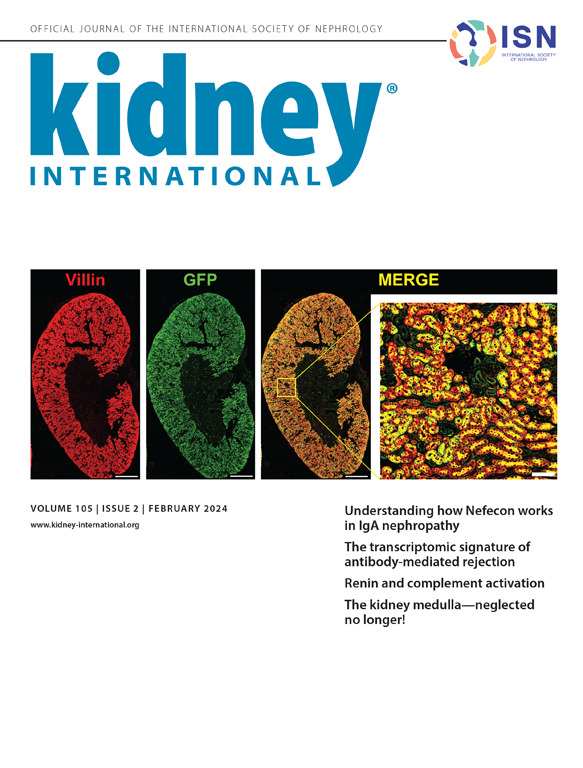Risk stratification of metabolic disorder–associated kidney disease
IF 14.8
1区 医学
Q1 UROLOGY & NEPHROLOGY
引用次数: 0
Abstract
During the last 20 years, the disease burden attributable to metabolic disorders increased by 49.4%. Metabolic disorders are established risk factors for both chronic kidney disease (CKD) and cardiovascular disease (CVD). A concept of cardiovascular-kidney-metabolic (CKM) syndrome has recently been proposed to underscore the pathophysiological interrelatedness of the metabolic risk factors, CKD, and CVD. Two major adverse outcomes of the metabolic disorder–associated kidney disease are cardiovascular disease and, to a less extent, kidney failure. This review aims to briefly summarize the traditional metabolic risk factors for kidney disease; to introduce the concept of CKM health; to present the methods for risk assessment for CKD progression and CVD, with focus on validated and clinically applicable prediction tools; and to discuss the key gaps in the current tools for the risk stratification. In summary, in general clinical settings, the CKM health and associated risk in patients with the metabolic disorder–associated kidney disease can be assessed by combining the CKM staging model, the CKD Prognosis Consortium equations for CKD progression, and the Predicting Risk of CVD Events (PREVENT) equations for CVD. More efficient risk prediction tools, potentially incorporating multimodal data, are needed for more accurate and early identification of individuals at high risk and better personalized management of the disease.
代谢紊乱相关肾脏疾病的风险分层。
在过去20年中,可归因于代谢紊乱的疾病负担增加了49.4%。代谢紊乱是慢性肾脏疾病(CKD)和心血管疾病(CVD)的危险因素。最近提出了心血管-肾脏代谢综合征(CKM)的概念,以强调代谢危险因素、CKD和CVD之间的病理生理相互关系。代谢紊乱相关肾脏疾病的两个主要不良后果是心血管疾病,以及在较小程度上肾衰竭。本文综述了肾脏疾病的传统代谢危险因素;引入CKM健康的概念;介绍CKD进展和CVD的风险评估方法,重点是经过验证和临床应用的预测工具;并讨论当前风险分层工具的主要差距。总之,在一般的临床环境中,代谢紊乱相关肾脏疾病患者的CKM健康状况和相关风险可以通过结合CKM分期模型、CKD进展的CKD预后联盟方程和CVD的prevention方程来评估。需要更有效的风险预测工具,可能包括多模式数据,以便更准确和更早地识别高风险个体,并更好地对疾病进行个性化管理。
本文章由计算机程序翻译,如有差异,请以英文原文为准。
求助全文
约1分钟内获得全文
求助全文
来源期刊

Kidney international
医学-泌尿学与肾脏学
CiteScore
23.30
自引率
3.10%
发文量
490
审稿时长
3-6 weeks
期刊介绍:
Kidney International (KI), the official journal of the International Society of Nephrology, is led by Dr. Pierre Ronco (Paris, France) and stands as one of nephrology's most cited and esteemed publications worldwide.
KI provides exceptional benefits for both readers and authors, featuring highly cited original articles, focused reviews, cutting-edge imaging techniques, and lively discussions on controversial topics.
The journal is dedicated to kidney research, serving researchers, clinical investigators, and practicing nephrologists.
 求助内容:
求助内容: 应助结果提醒方式:
应助结果提醒方式:


